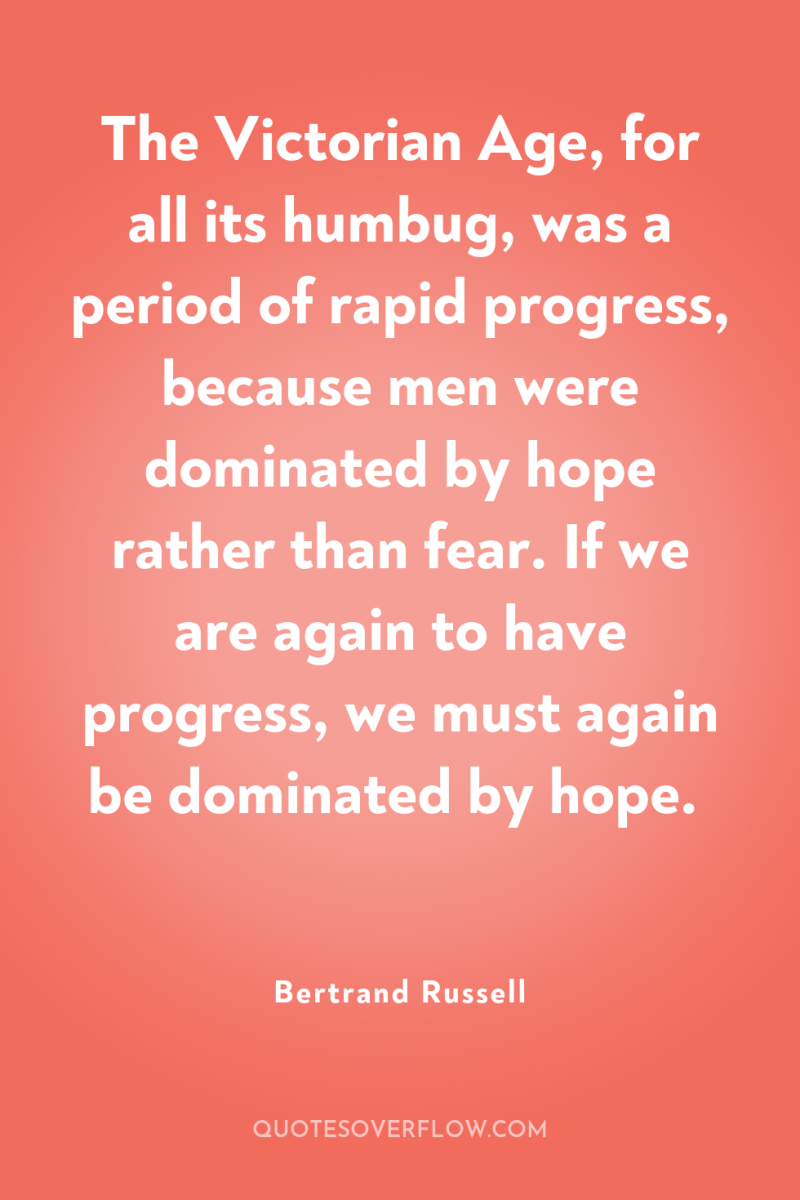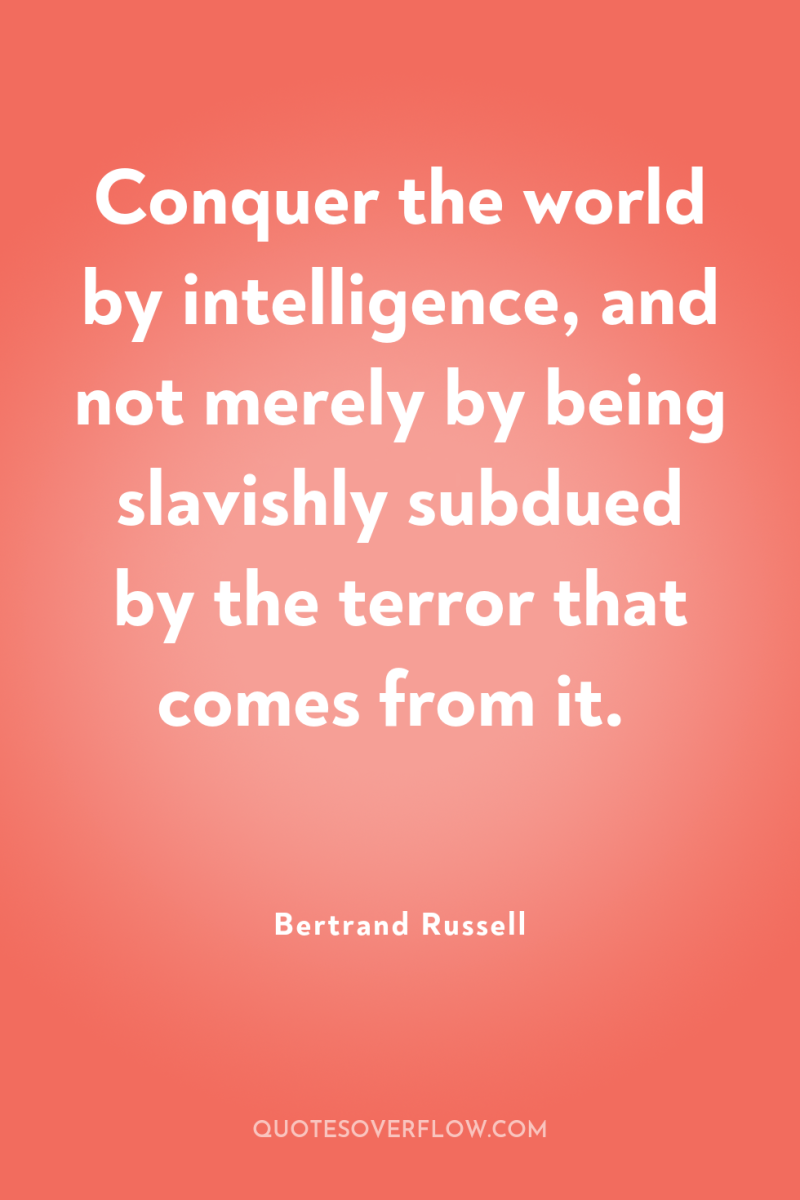
1
It is possible that mankind is on the threshold of a golden age; but, if so, it will be necessary first to slay the dragon that guards the door, and this dragon is religion.Bertrand Russell
2
Science can teach us, and I think our hearts can teach us, no longer to look around for imaginary supporters, no longer to invent allies in the sky, but rather to look to our own efforts here below to make the world a fit place to live.Bertrand Russell
3
You all know the argument from design: everything in the world is made just so that we can manage to live in the world, and if the world was ever so little different, we could not manage to live in it. That is the argument from design. It sometimes takes a rather curious form; for instance, it is argued that rabbits have white tails in order to be easy to shoot. I do not know how rabbits would view that application. .Bertrand Russell

4
The Victorian Age, for all its humbug, was a period of rapid progress, because men were dominated by hope rather than fear. If we are again to have progress, we must again be dominated by hope.Bertrand Russell
5
I do not pretend to be able to prove that there is no God. I equally cannot prove that Satan is a fiction. The Christian god may exist; so may the gods of Olympus, or of ancient Egypt, or of Babylon. But no one of these hypotheses is more probable than any other: they lie outside the region of even probable knowledge, and therefore there is no reason to consider any of them.Bertrand Russell

6
Neither love without knowledge nor knowledge without love can produce a good life.Bertrand Russell

7
Conquer the world by intelligence, and not merely by being slavishly subdued by the terror that comes from it.Bertrand Russell
8
It is true that the modern Christian is less robust, but that is not thanks to Christianity; it is thanks to the generations of freethinkers, who from the Renaissance to the present day, have made Christians ashamed of many of their traditional beliefs. It is amusing to hear the modern Christian telling you how mild and rationalistic Christianity really is and ignoring the fact that all its mildness and rationalism is due to the teaching of men who in their own day were persecuted by all orthodox Christians.Bertrand Russell
9
When the qualities that now confer leadership have become universal, there will no longer be leaders and followers, and democracy will have been realized at last.Bertrand Russell
10
That is the idea -- that we should all be wicked if we did not hold to the Christian religion. It seems to me that the people who have held to it have been for the most part extremely wicked. You find this curious fact, that the more intense has been the religion of any period and the more profound has been the dogmatic belief, the greater has been the cruelty and the worse has been the state of affairs. In the so-called ages of faith, when men really did believe the Christian religion in all its completeness, there was the Inquisition, with all its tortures; there were millions of unfortunate women burned as witches; and there was every kind of cruelty practiced upon all sorts of people in the name of religion. You find as you look around the world that every single bit of progress in humane feeling, every improvement in the criminal law, every step toward the diminution of war, every step toward better treatment of the colored races, or every mitigation of slavery, every moral progress that there has been in the world, has been consistently opposed by the organized churches of the world. I say quite deliberately that the Christian religion, as organized in its churches, has been and still is the principal enemy of moral progress in the world. You may think that I am going too far when I say that that is still so. I do not think that I am. Take one fact. You will bear with me if I mention it. It is not a pleasant fact, but the churches compel one to mention facts that are not pleasant. Supposing that in this world that we live in today an inexperienced girl is married to a syphilitic man; in that case the Catholic Church says, 'This is an indissoluble sacrament. You must endure celibacy or stay together. And if you stay together, you must not use birth control to prevent the birth of syphilitic children.' Nobody whose natural sympathies have not been warped by dogma, or whose moral nature was not absolutely dead to all sense of suffering, could maintain that it is right and proper that that state of things should continue. That is only an example. There are a great many ways in which, at the present moment, the church, by its insistence upon what it chooses to call morality, inflicts upon all sorts of people undeserved and unnecessary suffering. And of course, as we know, it is in its major part an opponent still of progress and improvement in all the ways that diminish suffering in the world, because it has chosen to label as morality a certain narrow set of rules of conduct which have nothing to do with human happiness; and when you say that this or that ought to be done because it would make for human happiness, they think that has nothing to do with the matter at all. 'What has human happiness to do with morals? The object of morals is not to make people happy.Bertrand Russell
11
We see, surrounding the narrow raft illuminated by the flickering light of human comradeship, the dark ocean on whose rolling waves we toss for a brief hour; all the loneliness of humanity amid hostile forces is concentrated on the individual soul, which must struggle alone, with what of courage it can command, against the whole weight of a universe that cares nothing for its hopes and fears. Victory, in this struggle with the powers of darkness, is the true baptism into the glorious company of heroes, the true initiation into the overmastering beauty of human existence.Bertrand Russell
12
The idea that things must have a beginning is really due to the poverty of our imagination.Bertrand Russell
13
A strange mystery it is that Nature, omnipotent but blind, in the revolutions of her secular hurryings through the abysses of space, has brought forth at last a child subject still to her power but gifted with sight, with knowledge of good and evil, with the capacity of judging all the works of his unthinking mother.Bertrand Russell
14
Where envy is unavoidable it must be used as a stimulus to one’s own efforts, not to the thwarting of the efforts of rivals.Bertrand Russell